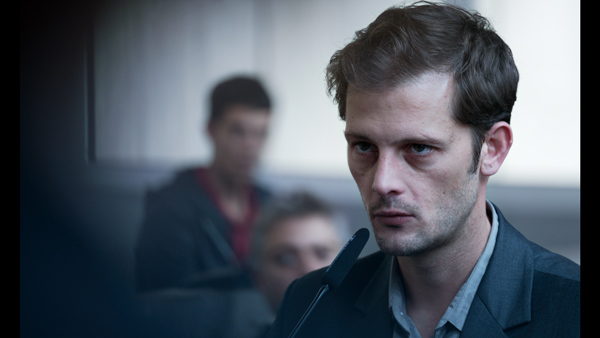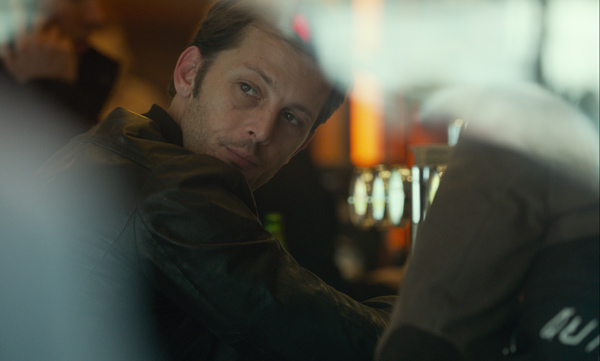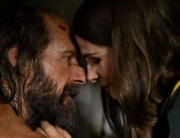Emmanuel Finkiel’s A Decent Man, a highlight at this year’s Rendez-Vous with French Cinema series in New York, opens with a close-up of a haggard, arresting face—a face that draws the eye and repels it at the same time, like a portrait by Egon Schiele. It belongs to Eddie Moreau (Nicolas Duvauchelle) in a film set in a battleground where tenderness, shiftiness, and cruelty fight to the death. Many movies try to frighten you. As this one zeros in on the disintegrating Eddie, this devastating film certainly will.
Estranged from his wife and son in the downcast outskirts of Lille, Eddie half-heartedly takes salesmanship courses to find a niche somewhere, anywhere. The young man’s hungover, hangdog inattention in class makes clear that he is about the last person on Earth with a future in sales. Right away we feel dismay at Eddie’s lack of self-awareness and judgment. Or is the awkwardness just an inability to fit into a world not worth fitting into? It’s one of the tensions the movie skillfully sets up and relentlessly follows through.
One night Eddie goes on a solo pub crawl, poses as a banker (a transparently unlikely disguise), and tries to pick up a pretty woman. Like the viewer, she veers between attraction and apprehension toward Eddie, who is clearly bad news but vibrates with an affecting vulnerability.
In a misguided attempt to impress his date, Eddie provokes a scuffle with a gang of teenagers that escalates into a gruesome beating and stabbing. Losing the fight lands Eddie in the hospital and offers him a chance to reconcile with his wife, Karine (Mélanie Thierry). It also gives him an occasion to falsely pin the violence on an innocent young Arab man (Driss Ramdi). The decision to carry out this barely understood act of malice sets the film in motion toward disaster.
From that point onward, Eddie’s screwups and outbursts could grow monotonous, but A Decent Man gathers immense strength. One key to the movie’s impact lies in Duvauchelle’s go-for-broke performance as a man capable of love but wired for destruction. There is something decent in this monster, smothered or just lost. Like Eddie, we will keep looking for it against all hope and evidence. Duvauchelle burns the screen as a slimy, ravaged presence you can’t take your eyes away from.
Striking sound design cranks up the movie’s sense of distress. Without even knowing they’re doing it, characters cringe from assaults by noise: construction jackhammers, bursts of derisive laughter, electronic peals and pops. Now and then lulls arise that give Eddie and Karine space to face bleak predicaments. Their crumpled body language suggests that facing silence may be more unbearable than cacophony. Brisk editing further sharpens a sense of dislocation while keeping the story moving faster than is typical for downbeat material of this kind.
Implicitly political, the story runs on rage, which overflows from its troubled central character straight to the viewer. Is Eddie a screwup? Bien sur. Is he right to hate the system around him? Yes, and so should we. The film unmasks the low-wage toil that props up the sterile, fake-cheery big box store where Karine and Eddie work. It flips a bird at French authority, which asserts power through mockery in the classroom, condescension on the job, and high-handed racial assumptions in the courts. Glimpses at the struggles of the guy Eddie identifies as one of his attackers make clear that the two men, at odds on the surface, fight similar battles. Karine is the only person in this dead end setting with any hope of getting ahead. There’s a reason for that, and it’s not a pleasant one.
A Decent Man ends in a burst of nihilistic brutality that feels American, if American movies were more honest about homegrown violence. For brutal emotional impact, there is nothing like this film out now. See it, but be prepared. It may haunt you for a long time.
Directed and Written by Emanuel Finkiel
Produced by Christine Gozlan and David Poirot-Gozlan
France. 111 min.
With Nicolas Duvauchelle, Driss Ramdi, and Mélanie Thierry








Leave A Comment